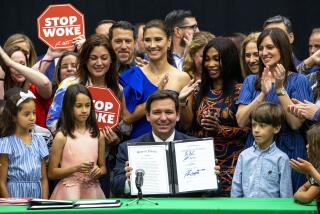Anti-gay bill pits Georgia’s conservative values against Hollywood’s inclusivity — much like the nation’s political divide
Hollywood’s threat to boycott production in Georgia over proposed anti-gay legislation is a collision of politics, culture and economics that reflects the divisive lines between conservatives and liberals playing out in the race for the White House. Both sides say it’s about values.
Georgia lawmakers see themselves as fighting to ensure religious freedom against societal trends and an ever-permissive Hollywood. But the entertainment industry, which is sometimes accused of resorting to situational ethics when the box office is at stake, says it’s seeking to uphold values of its own.
“Diversity in all its forms is core to our value system and to the success of our business,” Time Warner said in condemning the Georgia legislation. “We strongly oppose the discriminatory language and intent of Georgia’s pending religious liberty bill, which clearly violates the values and principles of inclusion and the ability of all people to live and work free from discrimination.”
Although it’s hard to predict just how widespread a boycott might be, there clearly is much at stake. Georgia has benefited enormously from film and TV production, while Hollywood has enjoyed lucrative tax breaks and lower labor costs. Now, the future of that multibillion dollar relationship has been jeopardized by a Georgia legislature determined to buttress its state from what it sees as the country’s drift toward a liberalism that defies Christian values.
What happens next is up to Republican Gov. Nathan Deal, who is under intense pressure to veto legislation that would protect faith-based institutions from providing services, such as performing gay marriages, contrary to their beliefs. Supporters of the bill, which was passed by lawmakers on March 16, say it safeguards religious freedoms and protects institutions from hiring people whose lifestyles they oppose.
The backlash against the proposed Free Exercise Protection Act escalated last week when the Walt Disney Co., Netflix, Weinstein Co., Amblin Partners and other entertainment industry firms said they would cease production in Georgia if the legislation is signed. They’ve joined other companies and institutions, including Atlanta-based heavyweights Coca-Cola, Delta Air Lines and Emory University, which have come out to oppose the bill.
At least 40 actors and filmmakers, including Anne Hathaway and Julianne Moore, entered the fray in what quickly coalesced into a struggle viewed by conservatives as a Hollywood attempt to impose its will on a state. Liberals, however, regard it as a morality play by Georgia legislators whose politics don’t speak to wider American sentiments on gay marriage and social issues.
Georgia state Sen. Joshua McKoon, a Republican proponent of the bill, said he believes the legislation is good for his constituents.
“We have numerous examples all over the state of people of faith being harassed or treated in a hostile way by various entities of government,” McKoon said. He cited as an example a “cross-country athlete this past year who was participating in a meet and he was disqualified for wearing a headband that included a Scripture reference.”
“There is no question,” said McKoon, that the fight over the bill is symptomatic of a wider culture gap between Hollywood and conservative southern states such as Georgia. The battle over values, a catch-all code word for Democrats and Republicans, has propelled a particularly acrimonious presidential campaign and has defined the polarization in American politics since Barack Obama became president.
The political debate over gay and transgender rights is also reverberating in other states. In North Carolina, businesses, including American Airlines and Lionsgate, have criticized a new state law that weakens civil rights protections for bisexuals, gays and transgender people.
The country is “deeply divided, and it’s on many levels,” said Wheeler Winston Dixon, a film studies professor at the University of Nebraska-Lincoln. “This is the stuff democracy is about. Everyone gets to make their choice, and Disney is making its [choice] with where they would shoot. That’s their right.”
Georgia, which chose Donald Trump over the more right-leaning Ted Cruz in its recent Republican primary, follows California and New York as the third-largest hub for film and television production in the country. In recent years it has offered hundreds of millions of dollars in tax breaks to producers and studios, and has grown accustomed to celebrities and big budget films.
“Fast and Furious 8” and “Baywatch” are currently shooting in the state. In the last fiscal year 248 films went into production in Georgia, bringing in more than $1.7 billion — up from $132.5 million in 2007. Georgia has been nicknamed the “Hollywood of the South” and Deal was instrumental in starting the Georgia Film Academy to help residents find jobs in the movie business.
Disney alone has funneled tens of millions of dollars worth of production to the state. Recent Disney projects to shoot in Georgia have included the Marvel Studios-produced “Ant-Man” and “Captain America: Civil War.” The production of “Ant-Man” spent $106 million in the state and employed 3,579 Georgians.
If there is a boycott, it will absolutely hurt us, and you know what, it should. This goes beyond business in general.
— Ric Reitz, president of SAG-AFTRA in Atlanta
Film producer Bill Mechanic, the former chairman and chief executive officer of Fox Filmed Entertainment, said that the level of industry response to the Georgia bill has been “highly unusual.”
“I don’t remember any other issue like this,” said Mechanic, who previously served as president of international distribution and worldwide video at Walt Disney Studios. He said it is a “good thing that a social issue was dealt with by somebody taking a stand.”
Actor and producer Mike O’Malley, the show runner on Starz’s Atlanta-based basketball comedy “Survivor’s Remorse,” said that people working in Georgia’s film economy are “worried about their employment.”
“People don’t want to travel to a place where you feel as if the majority of the people are in support of an idea of how people should be treated when it is against your core beliefs,” he said. “Life is hard enough.
“I have nothing bad to say about Atlanta, but I hope Georgia doesn’t pass this bill,” O’Malley said.
McKoon, however, questioned whether studios would make good on their boycott threats, claiming that their public statements were an effort to score “cheap public relations points.”
“Hairspray” director Adam Shankman, who produced the film “The Last Song,” which was shot in Georgia, insisted that the threats are genuine.
“We have other places to go to shoot,” Shankman said. “I believe that other states that are more liberal are going to take advantage of this and start offering those incentives to just steal that money back.”
Deal is in a sensitive predicament. His party is looking to appease Republicans ahead of the November elections, but Deal has been dogged about attracting the movie business; he hosted a reception last year dubbed “Georgia Night in L.A.” for studio executives and producers at the Sunset Tower Hollywood.
Those efforts now seem jeopardized by the controversial legislation.
“If there is a boycott, it will absolutely hurt us, and you know what, it should,” said Ric Reitz, president of SAG-AFTRA in Atlanta. “This goes beyond business in general.”
Times staff writers Josh Rottenberg and Yvonne Villarreal contributed to this report.
ALSO
‘It’s not supposed to be this way’: Why it’s getting more difficult for foster families
Deal reached to boost California’s minimum wage to $15, avoiding ballot box battle
UC President Napolitano to keep close tabs on Berkeley’s actions against sexual misconduct
More to Read
From the Oscars to the Emmys.
Get the Envelope newsletter for exclusive awards season coverage, behind-the-scenes stories from the Envelope podcast and columnist Glenn Whipp’s must-read analysis.
You may occasionally receive promotional content from the Los Angeles Times.








